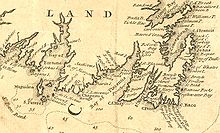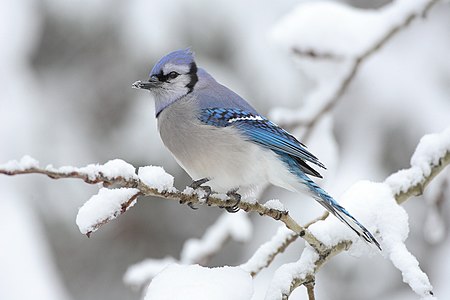Portal:Canada
| Showcase | Contents | Contributing |
Introduction
Canada is a country in North America. Its ten provinces and three territories extend from the Atlantic Ocean to the Pacific Ocean and northward into the Arctic Ocean, making it the world's second-largest country by total area, with the world's longest coastline. Its border with the United States is the world's longest international land border. The country is characterized by a wide range of both meteorologic and geological regions. With a population of just over 41 million people, it has widely varying population densities, with the majority residing in urban areas and large areas of the country being sparsely populated. Canada's capital is Ottawa and its three largest metropolitan areas are Toronto, Montreal, and Vancouver.
Canada is a parliamentary democracy and a constitutional monarchy in the Westminster tradition. The country's head of government is the prime minister, who holds office by virtue of their ability to command the confidence of the elected House of Commons and is appointed by the governor general, representing the monarch of Canada, the ceremonial head of state. The country is a Commonwealth realm and is officially bilingual (English and French) in the federal jurisdiction. It is very highly ranked in international measurements of government transparency, quality of life, economic competitiveness, innovation, education and human rights. It is one of the world's most ethnically diverse and multicultural nations, the product of large-scale immigration. Canada's long and complex relationship with the United States has had a significant impact on its history, economy, and culture.
A developed country, Canada has a high nominal per capita income globally and its advanced economy ranks among the largest in the world, relying chiefly upon its abundant natural resources and well-developed international trade networks. Recognized as a middle power, Canada's strong support for multilateralism and internationalism has been closely related to its foreign relations policies of peacekeeping and aid for developing countries. Canada is part of multiple international organizations and forums. (Full article...)
Featured article -
The Newfoundland expedition was a naval raiding expedition led by English Captain John Leake between August and October 1702 that targeted French colonial settlements on the North Atlantic island of Newfoundland and its satellite, Saint Pierre. The expedition occurred in the early days of Queen Anne's War, as the North American theater of the War of the Spanish Succession is sometimes known. (Full article...)
Featured biography -

Arthur Albert Irwin (February 14, 1858 – July 16, 1921), nicknamed "Doc", "Sandy", "Cutrate" or "Foxy", was a Canadian-American shortstop and manager in Major League Baseball (MLB) during the late nineteenth century. He played regularly in the major leagues for eleven years, spending two of those seasons as a player-manager. He played on the 1884 Providence Grays team which won the first interleague series to decide the world champions of baseball. Irwin then served as a major league manager for several years. (Full article...)
Selected panorama -
National symbol -
The coat of arms of Canada (French: Armoiries du Canada), also known as the Royal Coat of Arms of Canada (French: armoiries royales du Canada) or, formally, as the Arms of His Majesty The King in Right of Canada (French: Armoiries de Sa Majesté Le Roi du Canada), is the arms of dominion of the Canadian monarch and, thus, also the official coat of arms of Canada. In use since 1921, it is closely modelled after the royal coat of arms of the United Kingdom, with French and distinctive Canadian elements replacing or added to those derived from the British version. (Full article...)
Selected vital article -
Canada, the world's second-largest country in total area, is dedicated to having an efficient, high-capacity multimodal transportation spanning often vast distances between natural resource extraction sites, agricultural and urban areas. Canada's transportation system includes more than 1,400,000 kilometres (870,000 mi) of roads, 10 major international airports, 300 smaller airports, 72,093 km (44,797 mi) of functioning railway track, and more than 300 commercial ports and harbours that provide access to the Pacific, Atlantic and Arctic oceans as well as the Great Lakes and the St. Lawrence Seaway. In 2005, the transportation sector made up 4.2% of Canada's GDP, compared to 3.7% for Canada's mining and oil and gas extraction industries. (Full article...)
Selected picture -
Current events
- November 15, 2024 –
- The Canadian Union of Postal Workers go on strike after failing to renegotiate their contract with Canada Post. (AP)
- October 25, 2024 –
- A man fatally shoots two of his family members before killing himself in Huntsville, Ontario, Canada. (CTV News Barrie)
- Ontario Premier Doug Ford's government announces that Ontario is planning to ban international students from medical schools in the province beginning in 2026. (Pelham Today)
- October 24, 2024 –
- Four people are killed and one other is seriously injured when a Tesla car crashes into a guardrail and struck a concrete pillar at high speed after losing control causing a fire in Toronto, Canada. (CTV News Toronto)
- October 15, 2024 –
- The Palestinian Prisoner Solidarity Network is designated as a terrorist group by the Canadian government and is sanctioned by the U.S. government, due to the group's alleged ties to the Popular Front for the Liberation of Palestine. (CTV News)
- October 10, 2024 – Russian invasion of Ukraine
- The World Bank approves a new financial intermediary fund consisting of grants from the United States, Japan, Canada, and other countries coupled with interest from frozen Russian assets to give to Ukraine as part of a $50 billion loan. (Reuters)
Did you know -

- ... that while seeking funding for The Clarion, Carrie Best was told by a donor: "You are just a small voice crying in the wilderness – but keep on crying"?
- ... that according to Modern Times, a San Francisco–based bookstore collective, if there was only one book that you read in 1975 it had to be Canadian author and activist Helen Potrebenko's Taxi!?
- ... that Irene Parlby was one of The Famous Five, a group of women in Canada who fought for the right of women to be considered "persons"?
- ... that the Ukrainian Holodomor Memorial Day, commemorating the victims of the 1932–33 famine, is also observed in Canada?
- ... that a journalists' poll rated Billy Fitzgerald the second-best Canadian lacrosse player of the first half of the 20th century?
- ... that the Canadian rock band Rainbow Butt Monkeys changed their name to "Finger Eleven" before releasing their second album Tip?
- ... that Sheila Egoff, Canada's first professor of children's literature, returned to her library work immediately after retirement?
Featured list -
Canada is a federation that comprises ten provinces and three territories. Its government is structured as a constitutional monarchy and a parliamentary democracy, with a monarch as its sovereign and a Prime Minister as its head of government. Each of the country's provinces and territories also has a head of government, called premier in English. Collectively, the federal Prime Minister and provincial and territorial premiers are referred to as first ministers. In French, the term premier ministre is used in both the federal and provincial/territorial contexts. (Full article...)
Main articles
Associated Wikimedia
The following Wikimedia Foundation sister projects provide more on this subject:
-
Commons
Free media repository -
Wikibooks
Free textbooks and manuals -
Wikidata
Free knowledge base -
Wikinews
Free-content news -
Wikiquote
Collection of quotations -
Wikisource
Free-content library -
Wikiversity
Free learning tools -
Wikivoyage
Free travel guide -
Wiktionary
Dictionary and thesaurus






























